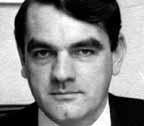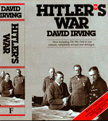ABOUT DAVID IRVING: | |||
 COMMANDER JOHN IRVING, RN, David Irving's father, was an author, Arctic explorer and naval gunnery officer who served in the Battle of Jutland in 1916 and in the harrowing North Russian convoys of World War II. His many books, including histories of the royal yacht The King's Britannia and of great naval actions like Coronel and the Falklands. These and his glossary of naval slang Royal Navalese are standard works in naval libraries. Father and son collaborated on his last work The Smokescreen of Jutland | |||
Universal
Pictorial Press & Agency
Born in Essex, England, on March 24, 1938, he is the son of an illustrator and a naval officer. Irving is author of widely reviewed and sometimes controversial major works of modern history including biographies of Hitler, Churchill, the field marshals Rommel and Milch. Some say his books have established a new school of history. Rolf Hochhuth, Germany's leading liberal Left-wing playwright, and a close friend since 1965, has written: "We may not like what he writes, but historians a hundred years hence will find it impossible to ignore the works of David Irving." Through books closely researched from original documents that have often been made exclusively available to him, Irving has won admirers worldwide but has also set himself at loggerheads with the established body of historians. When British and West German students cite his works, they often do so at their own risk, earning chagrin and disapproval of their teachers. After an Arts education at four-hundred year old Sir Anthony Browne's school in Brentwood, Essex, he won an I.C.I. scholarship to read physics at London university. In 1959 he joined August Thyssen steelworkers in the Ruhr, the industrial heartland of Germany, to perfect his knowledge of their language, then worked as a clerk-stenographer with the U.S. Strategic Air Command at an airbase near Madrid before returning to London to read political economy. Encouraged by Werner Höfer, who was then editor of the Cologne-based magazine Neue Illustrierte, to compile a 37-part serial about air warfare -- which was then a taboo subject for Germans -- Irving began to write. His first book was an immediate worldwide best-seller: The Destruction of Dresden, published in 1963, marked a milestone in the British public's attitude to air warfare against non-combatants. At the time, the 1945 air raids that had taken place on Dresden were not widely known. Irving has been a professional historian ever since [booklist]. Father of four daughters, [since 1994: five daughters] he lives in Mayfair in London's West End. BY RESEARCHING WORLDWIDE in archives, including several behind the Iron Curtain, Irving has been able to establish theories that often differ widely from those of rival historians who, he says, lack either the taste, the time or the resources for such labours. He relies as far as possible on original source material like diaries, letters and documents. This enables him to lay aside the printed works of reference more commonly used. Thus he avoids the errors and prejudices of other authors. Results are often startling, and frequently hotly contested. His 1967 history of the disastrous Anglo-American convoy PQ.17 attracted one of the costliest libel actions in British legal history. The British convoy escort commander Captain Jack Broome accused Irving of blaming him for the disaster. Both author and publisher (Cassell & Co) denied this, pleaded justification, and appealed the verdict to the House of Lords. Broome, though winning the action on a 4:3 vote (Lord Hailsham giving the casting vote as Lord Chancellor), was ordered to pay a substantial and crippling share of the costs. This case, a legal landmark remains the only libel action brought successfully against David Irving in twenty-five years of writing. HIS RIVALS HAVE used various methods in their attempts to dispose of him:
Irving instructed Viennese lawyers to pursue the matter on his behalf against the Austrian government and in the Court of Human Rights. | |||
Television personality David Frost attempted to demolish this theory in one of his most spectacular television shows on June 7, 1977, and fell flat on his face. Irving was wise to Frost's methods, having been his guest three times before; he ripped pages out of the bulky, 1,000-page Hitler biography in a pre-arranged gesture, steamrolled Frost's arguments and invited experts aside, and was acclaimed the clear winner by next day's newspapers. Said the Daily Mail: "If you saw author David Irving defending himself and his theory on the Frost Programme this week, you would have witnessed that he has the nerve and the obsession to make such a statement [that there is no proof Hitler even knew of the Holocaust]. He fought his case with fanatical courage, taking on David Frost, rival anti-Hitler historians and a highly partisan audience."
IRVING CONSIDERS HIMSELF a "dissident" rather than revisionist historian. His politics are ultra-conservative. In 1980 he founded a small London-based political group, Focus. Its magazine Focal Point was widely read for two years, publishing scoops that included Idi Amin's personal investigation file on the Israeli Entebbe raid; the Tyler Kent espionage case, and (April 1982) disclosures about Hitler diaries said to be about to surface in West Germany. His hobbies are oil-painting, travel, cinematography. He lectures to right and left-wing groups, to university students and to American and German army officers, attracting large audiences (and not infrequently extremist demonstrations) whenever he appears. He has been working since 1974 on a biography of Churchill's war years. As that manuscript, now finished, has attracted the rancour of its contracted publishers, he is diversifying as a safety measure into worldwide journalism too. His articles are regularly published in sixty British and foreign newspapers ranging from the Yorkshire Post and Basler Zeitung to the Mainichi Shimbun in Tokyo. His books have been serialised in Der Spiegel, the Sunday Express, the Sunday Telegraph, and Neue Illustrierte. His writing has won awards including the Sir Arthur Acland English Essay Prize at London University to the Hungarian Freedom Fighter's Pro Libertate Hungariae in 1981 and the European Freedom Prize of the German People's Union in 1982.
"When it comes to original sources," wrote Australia's National Times after interviewing him, "Irving is not just meticulous, but indefatigable." He has made no mumbo-jumbo about his research files: he has donated his entire archives to the Munich Institute of Contemporary History where they are already available to other writers without restriction; microfilm copies are freely obtainable also from a West Yorkshire company, Microform Ltd of East Ardsley. No other historian has ever been so generous with expensively assembled document collections. In Fleet Street, London's newspaper district, Irving is the object of much envy and some spite. In 1967 the satirical magazine Private Eye found out that the conservative Daily Telegraph -- piqued by Irving's revelations on Winston Churchill's role in assassination plots -- had solemnly briefed sub-editors in an internal memorandum not to refer to him in future as the "historian," but as the "writer"; to their credit, they have long ago removed that directive. (Irving had written to chief editor Maurice Green saying he would not personally object if the Telegraph referred to him as a Council dustman). The Left-wing and Liberal newspapers have not given up trying to demolish him. After columnist Alan Rusbridger of The Guardian linked Irving's political secretary tortuously with the name of "a wanted Italian terrorist," the newspaper had to publish a cringing, abject apology. Unable to destroy him by objective means, The Guardian sent Irving's handwriting anonymously to graphologist Gloria Hargreaves, and got back the report: Not what they had wanted, but they
printed it all the same. | |||
SELECT BIBLIOGRAPHY The Phoenix, Imperial College, London SW7, magazine. Summer 1959 David Irving, "Men Behind Germany's Miracle," Daily Telegraph, September 6, 1960 Paris Match, June 1, 1963 Der Spiegel, June 19, 1963 Susan Barnes, "Portrait of a Gentleman", Sunday Times Supplement, September 6, 1970 David Irving, "Potsdam Notebook," Sunday Times, February 21, 1971 Susan Barnes, Behind the Image (London, 1974) Peter Lewis in The Daily Mail, June 11, 1977 Janet Watts, "The Wednesday Page," The Guardian, June 8, 1977 Guido Knopp (ed.) Hitler Heute (Aschaffenburg, 1979) Naomi Bliven, "The Naked Emperor," New Yorker, August 29, 1977 BBC TV The Frost Programme, June 7, 1977 West Deutscher Rundfunk Monitor, December 5, 1979 Kai Bird, "The Secret Policeman's historian," New Statesman, April 3, 1981 | David Irving: "Reviewed vs. Reviewer," New Statesman, May 8, 1981 Glennys Bell, "Life with the Führer and seventy feet of files," The National Times (Australia) February 20-25, 1978 "David Irving: A Man Meets his Destiny", in Searchlight, March 1982 Professor A. Clare; The Listener, August 12, 1982 C.C. Aronsfeld, "David Irving in Germany," in Patterns of Prejudice, vol. 16, no. 2, 1982 NBC To-day programme, April 25, 1983 ABC Nightline April 25, 1983; ABC 20:20 May 1983 Jerry Bauer, "David Irving. Conversazione senza complessi con lo storico del 'sensazionale'," Playmen, Rome, March 1983 The Guardian, June 4th, December 8th, 1983 David Hooper: Public Scandal, Odium and Contempt (Secker & Warburg, London 1984 Professor A. Clare, In the Psychiatrist's Chair (London, 1984) Robert Harris, "Meeting Mr Reich," The Tatler, September 1984 Nicholas Leonard, "Churchill -- the Book they Dare not Publish," in Sunday Independent, Dublin, May 5, 1985 | ||
 BEFORE
AN AUDIENCE of 2,000 Germans
attending a Hitler symposium at Aschaffenburg David
Irving once challenged their historians, "Do you Want
Total Truth?"
BEFORE
AN AUDIENCE of 2,000 Germans
attending a Hitler symposium at Aschaffenburg David
Irving once challenged their historians, "Do you Want
Total Truth?" In
1977 after ten years' research Irving published his best
known work,
In
1977 after ten years' research Irving published his best
known work,